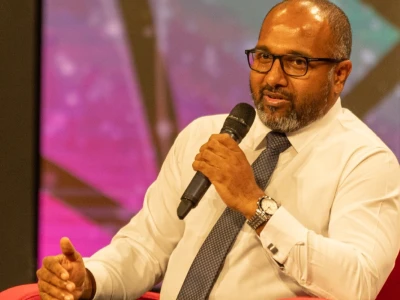
Maldives begins 3 year program to regularize undocumented expats
Ihsan said with the work started on Thursday, undocumented immigrants will be admitted to the system immediately if the person wishes to do so.
By
Aishath Fareeha Abdulla
As part of the government's efforts to find a permanent solution to the problem of undocumented expatriate workers in the country, operation 'Kurangi' has been launched to ascertain the identity of the migrants and collect their data.
The Homeland Security Ministry, Police and Immigration jointly launched the operation on Thursday from Himmafushi in Kaafu atoll.
Speaking at the ceremony in Himmafushi, Homeland Security Minister Ali Ihsan said the first half of the work to find a permanent solution to the problem of undocumented or illegal foreigners in Maldives will be completed within a year. However, it will take three years to complete all the work, he said.
“The work we have decided to do within the first year is to find foreigners who are working illegally in different parts of Maldives and enter them into our system,” he said.
Ihsan said foreigners working illegally in different areas will be brought into the official system through this operation.
The operation began in Himmafushi on Thursday by taking the biometric data of all foreigners working in the island along with their photographs and uploading it to the government's central system.
"By the time this work is completed, we will know who entered the country for what purpose, and in whose name, or under what company when we locate them and trace their whereabouts through the system," Ihsan said.
He said there are undocumented foreigners working in construction, food and providing cleaning services in Himmafushi.
He said it is illegal for foreigners brought to Maldives under the name of one sponsor to work for another.
"A lot of people have been doing it that way on a permanent basis. The social problems that come out of this are so many. At the same time, the national security issues that the state faces are great too," he said.
"We are taking this issue as a security concern, in the name of national security. That is how we are working on it”.
Ihsan added:
-
By the end of the first year of work, we will be able to identify which countries the foreigners belong to, how many foreigners are in different parts of the country and who is sponsoring them or where they are working
-
Then in the next two years, biometric identification will be set up to identify the undocumented people and their photo identifications will be done too
-
If there is no information about an expatriate within the government system, he can contact the embassy of his country to get his original paperwork that can identify him and then he will be deported from Maldives
The minister said there is a large market for unskilled labour in Maldives. The demand for such workers will increase especially when the government starts infrastructure development projects, he said.
“It is essential to have unskilled labourers in Maldives who work in accordance with the rules,” Ihsan said.
He said the purpose of the operation was not to arrest and deport foreigners.
"The full focus of the operation at the moment is to identify expatriates, learn who is where and what the person is doing, to document them," he said.
Ihsan said with the work started on Thursday, illegal immigrants will be admitted to the system immediately if the person wishes to do so.
"It means that if a fugitive wants to move under the name of someone on this island, he has to pay the state all dues and complete the procedures he has to follow and he will immediately be issued a work permit, if it is possible," he said.
The minister said one of the main purposes of the operation is to document everyone willing to stay and work in Maldives, but have their papers out of order.
A register of foreigners in each island will be compiled and the information will be shared with the council, he said. He said he would also try to ensure that the ministry does not lose control of foreigners' information.
“From time to time, the police and the council will question foreigners on the island and verify if they should be there,” Ihsan said.
He believes that if the work continues, there will be a permanent solution to the problem.
The previous government also launched a huge program to regulate undocumented immigrants and keep their records.
On October 5, 2019, the national stadium in Male was filled with expatriates who gathered to register with the government when it was opened. The registration process had to be moved to the stadium because of the overcrowding and high demand for the services from expatriates that needed help regulating themselves.




